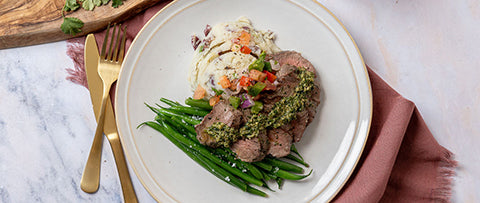When it comes to snacking, you may feel guilty for indulging in food outside of mealtimes, though you might not be sure why. Is snacking actually good or is it bad for you? Will snacking make you gain weight? If not, how many snacks are best to consume in a day?
In the past, snacking has gotten a bad wrap due to its long-term association with mindless acts of boredom and giving into emotions, only leading to weight gain. Contrary to its historic connotation, snacking has been shown to promote weight loss and keep it off for life--if done properly.
In this blog I’ll cover what healthy snacking is, why it can be important for health, and how to snack to lose weight and live a healthy lifestyle.
What is Healthy Snacking?
Snacking or snacks, in general, are smaller amounts of foods consumed between mealtimes. Typically, a morning snack (#1) is eaten between breakfast and lunch, mid-day snack (#2) consumed between lunch and dinner, and evening snack (#3) between dinner and bedtime.
Most Americans consume 25% percent of their total daily calorie intake with snacks, which can be done all in one bite or split up between multiple snacks. There is not one right or wrong way; it really depends on what fits in your life. It’s not necessarily the act of snacking or the number of snacks that makes the biggest impact (positive or negative), it’s WHAT we choose to consume during that snack time.
For example, the 2015-2020 Dietary Guidelines for Americans states that 31% all added sugar consumption comes from snacks and sweets, not mealtimes. While these types of snacks can be detrimental to nutritious eating, healthful ones can provide the body with truly long term benefits. Healthy snacks are portion controlled, nutritionally balanced, and made with quality ingredients.
Food Category Sources of Added Sugars in the U.S. Population
Why Is Healthy Snacking Important?
Intentional, healthy snacking has helped hundreds of people lose weight and keep it off for life. Here are some benefits to purposeful snacking:
Manages blood sugar levels.
By continuing to fuel yourself with needed energy throughout the day, you are able to keep blood sugar levels more consistent and within optimal ranges.This has been especially important for people with pre-diabetes/diabetes or anyone who struggles with a sensitivity to high/low blood sugar levels.
Reduces brain fog
Often times we don’t consume enough food (fuel) for our brain to think. Remember, your brain needs energy to think just like your body needs energy to move. Snacking promotes alertness and helps you focus better at the office or at home watching the kids. If you feel like you’ve been more forgetful lately, reflect on if you are eating enough.
Increases energy levels
If you find yourself needing that midday cup of coffee just to get through a workday, ask yourself when was the last time you had something to eat? Food provides energy to the body and if you are consistent with nourishing it, you will feel the effects of better energy levels and naturally won't need as much caffeine.
Curbs cravings
Having a snack between meal times actually helps control cravings. Typically that salty sweet desire is really your body wanting quick energy from processed and refined junk food.
Helps manage portions at mealtimes
It’s way easier to manage your hunger and portions when you go 3 hours between meals rather than 6-10 hours. If you find it challenging to control your portions and overeat during meal times, grab a snack a few hours prior and see how much it helps.
Promotes better sleep
If we are going to bed at night with a binge-full stomach, it can make the body feel uncomfortable and hard to get to sleep. Instead of waiting all day to eat leading to a bulk feeding in the evening, purposefully disperse out your nutrition throughout the day.
Now that you know why snacking can be so helpful to losing weight and living a healthy lifestyle, let’s talk about four easy tips to do it right.
How to Snack Healthfully: 4 Tips
How much you eat in a day and the amount of time between meals greatly affects your personal snack needs. Remember, there’s no one perfect way to snack and everyone will snack differently. Here are a few best practices for snacking:
1. Watch the QUANTITY of food
You might not want to consume the same amount of food for a snack as you would a meal. Listen to your body. How does it feel with the current quantity you are providing it? Did this snack hold you over until your next mealtime? On the other hand, you don’t want to be too full from your snack because it can inhibit you from wanting to eat your next meal on time.
2. Choose a BALANCE of at least 2 macronutrients
It can be very challenging for every snack to have a perfect balance of lean protein, heart healthy fats, and complex carbs. Shoot for 2 out of 3 macronutrients such as:
- Greek yogurt (protein) with berries (carbs)
- A handful of nuts (fat) with an egg (protein)
- Some raw veggies (carbs) with yogurt dip (protein)
- A fruit smoothie (carbs) with a scoop of protein (protein)
- Oatmeal bite (carbs) with almond butter (fat)
- A granola bar (carbs/fat) fortified with protein (protein)
- Low fat cheese (protein) with whole grain crackers (carbs)
- Banana (carbs) with peanut butter (fat)
- Avocado (fat) with veggies or sprouted grain toast (carbs)
3. Focus on QUALITY of ingredients
Where are your foods coming from? Just like meals, snacks should be made of real food ingredients like lean protein, heart healthy fats, and complex carbohydrates that are minimally processed. If you choose to fuel up with a bar, check the ingredient list. Is there a laundry list of ingredients you can't pronounce? If so, put it back and find another.
4. Make snacks CONVENIENT
Choose foods that can be taken with you on-the-go because, let’s be honest, we are always super busy. Stock food at your desk at work, in your purse and in your car. If things get crazy and a meal happens to be much later than expected, grab a wholesome snack to keep you fueled.
The bottom line, start small and reflect on when you are the most hungry throughout the day. With a bit of planning and these easy tips, you will be on track to using healthy snacking as a way to promote weight loss and keep it off!
I highly recommend fit-flavors healthy, convenient snacks to lose weight and live a healthy lifestyle. Here are a few crowd favorites you might like:






